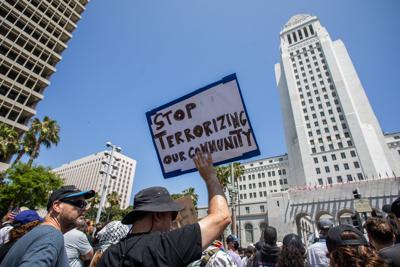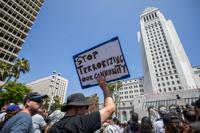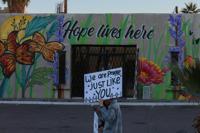
Protestors against immigration raids gather in front of the Los Angeles City Hall on June 08, 2025 in Los Angeles, California. Tensions in the city remain high after the Trump administration called in the National Guard against the wishes of city leaders following two days of clashes with police during a series of immigration raids. (Apu Gomes/Getty Images)
When Fernanda’s husband left home one morning in March, she didn’t expect that to be the last time he would ever do so. He was soon after detained by Immigration and Customs Enforcement (ICE) agents as he was heading to work in southern Arizona, near Nogales.
Fernanda — who asked that her full name not be published to protect her family — and her husband had just found out she was pregnant when he was detained and deported to Mexico.
She and their children, all U.S. citizens, were forced to move to Tucson, where her mother lives.
Before her husband's arrest, "We already had stability, our home, our jobs. We had the news that I was pregnant and they took him away two weeks after we found out," she shared with CALÓ News.
Six months into her pregnancy, Fernanda is navigating a new family life without her husband, an absence that impacts her children as well. Her eldest, she said, is in therapy after his father's arrest, causing him to want to drop out of school and stop playing sports.
Not having that father figure at home affected him, his mother explained.
Thousands of families have been fractured by immigration raids in the United States, especially in recent months as President Donald Trump's administration carries out massive raids and arrests across the country.
As of July 27, more than 56,000 people were in the custody of immigration authorities, according to data collected by the Transactional Records Access Clearinghouse platform, which tracks migrant detentions in the United States.
Although attention in these cases often focuses on the legal and immigration proceedings, mental health consequences also arise during and after separations, as well as when families and communities live in fear of being taken next.
Dr. Alfonso Mercado, psychologist, president of the National Latinx Psychological Association, and professor at a university in Texas, explained to CALÓ News that people are afraid to leave their homes because of the raids, and this constant fear, if left untreated, can affect their personal lives, their social relationships, and their physical, emotional and mental well-being.
However, seeking mental health care is not as common in the Latino community. The topic is often taboo among Latino families. Furthermore, it is a specialty that is often expensive and inaccessible to many, and there is a lack of Latino psychologists and therapists in the industry.
According to figures from the American Psychological Association, in 2021, only eight percent of industry specialists identified as Latino, adding significant cultural and language barriers for Latinos to seek care.
Raids sow fear in the community
In Arizona, the massive raids that took place across the Valley in the early 2000s sowed panic among the migrant community, forcing many to stay home and flee the state. That same fear has resurfaced in spades — as is the case with Fernanda's family.
And the physical symptoms one exhibits are directly linked to one’s mental health during these times, Mercado explained.
“The symptoms of mental health, trauma, depression and anxiety manifest physically in the body, such as headaches, backaches, knee pain, stomach pain, excessive sweating and often the pain is psychological,” Mercado said. And as the raids are broadcast on the news and looped on social media feeds, viewers are very likely to develop post-traumatic stress if left untreated. Prevention is crucial, he emphasized.
With this latent fear, many people avoid leaving home, making it more difficult for them to seek help in person, which is why many therapists are providing care online. Dr. Yanira Hernández founded Pa’lante Therapy to provide online and in-person therapy in Los Angeles, where she’s based.
Hernández is also part of the Latinx Therapy network, which offers free therapy to families affected by ICE. The organization was founded by Adriana Alejandre, a trauma therapist.
Without being able to go out, isolation and depression stem from avoiding day-to-day activities, sometimes as simple as going for a walk with their pet, Hernández explained. Constant fear can lead to anxiety, she said.
“With therapy, we begin to learn how to manage emotions, how to understand your body when it feels a certain way. If you don't know how to talk about emotions, we keep everything that's happening right now to ourselves and it further impacts our mental health,” Hernández said.
As specialists, Hernández said they want to help those affected so they know they're not carrying it alone. With therapy, they provide different tools to help patients recognize bodily reactions, relax their minds when thoughts seem to be running wild and provide the tools so that their minds and bodies can rest.
Low-cost and free resources for the community
Recent ICE enforcement has paved the way for organizations, therapists and networks of specialists to offer free or low-cost services to impacted individuals and their families.
Latinx Therapy offers free and low-cost sessions. Those interested in treatment with a Spanish-speaking Latino specialist can search by region. If you live in Arizona, for example, you can use the tool that allows you to search specifically in that state. This is important given that many specialists can only treat people who live in the state where they are certified, even if the sessions are online.
"Different therapists are offering free sessions for people affected by the raids because we're seeing a lot of fear," Hernández said.
This free service is invaluable, as the cost of a private consultation with a therapist or psychologist varies depending on the specialist and the state where you live. In California and Arizona, the cost often starts at $150 per session.
In addition to offering free services, some specialists like Hernández also offer a special rate for DACA recipients, as well as an additional discount if you are unemployed.
The Mexican Consulate General in Phoenix offers free mental wellness workshops, as well as legal consultations, development workshops, community forums, among other services. See their Instagram account for more details.
The Phoenix-based organization Aliento, which supports migrant and mixed-status students, offers art and healing workshops in schools and other locations. On their website, they also offer resources where people can find therapy locations, but they must contact those organizations directly to make an appointment, explained Ileana Salinas, Cultiva program manager.
In Tucson, Arizona, Clínica Amistad primarily offers health services for diabetes, high blood pressure, high cholesterol, and health issues, but also offers the services of a mental health counselor. All consultations are free, said Héctor Rico, the clinic's director.
If anyone needs mental health counseling services, they can call the clinic at (520) 305-5107 to schedule an appointment. There is currently a waiting list because only one counselor is available, and the wait time is approximately one month, the director explained.
César Barrón is an independent reporter covering the transnational communities of Ambos Nogales. He has over 20 years of experience covering the Sonoran communities.













(0) comments
Welcome to the discussion.
Log In
Keep it Clean. Please avoid obscene, vulgar, lewd, racist or sexually-oriented language.
PLEASE TURN OFF YOUR CAPS LOCK.
Don't Threaten. Threats of harming another person will not be tolerated.
Be Truthful. Don't knowingly lie about anyone or anything.
Be Nice. No racism, sexism or any sort of -ism that is degrading to another person.
Be Proactive. Use the 'Report' link on each comment to let us know of abusive posts.
Share with Us. We'd love to hear eyewitness accounts, the history behind an article.